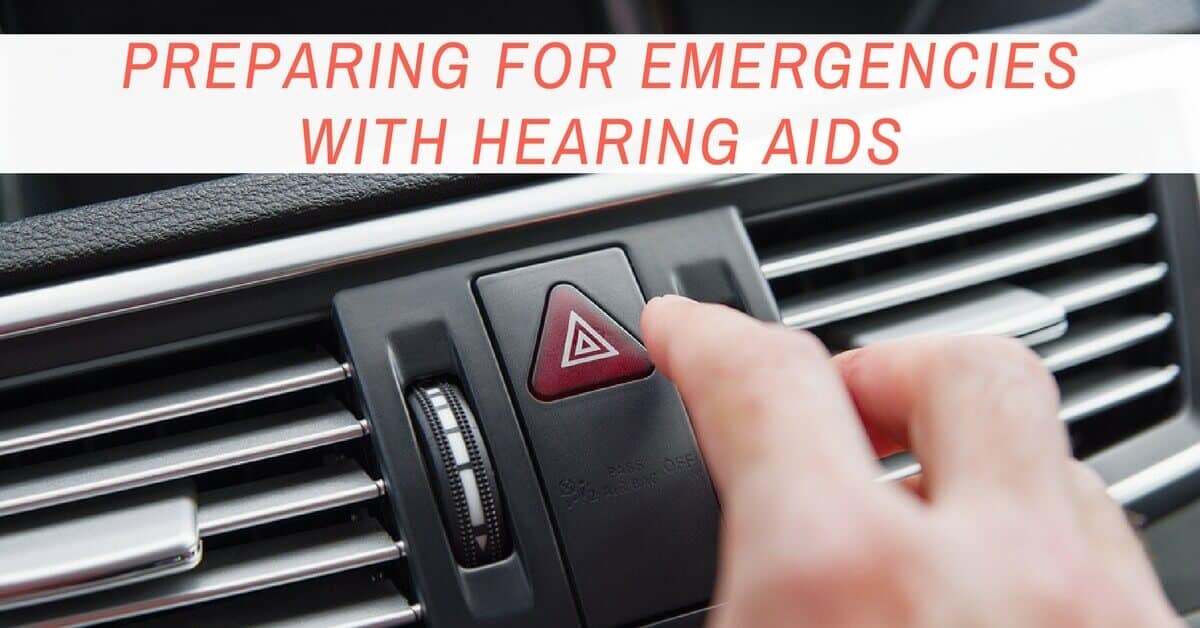
Most people lead disaster-free lives, and don’t have to worry about tsunamis, hurricanes, floods, earthquakes, or wildfires affecting their city. But it’s never a bad idea to be prepared for emergencies, especially if you’re a hearing aid wearer. You rely on these devices to help you in every aspect of your life, so it pays to be prepared.
Preparing for Emergencies
If you wear hearing aids, you know that unexpected events come with a lot of extra challenges and lead to stress and anxiety. Are you out of batteries and worried your hearing aid will run out of power soon? Do you have the number of your hearing specialist on hand to help troubleshoot problems?
When it comes to emergencies or life-threatening situations the stakes are far higher, so for your peace of mind and for your safety, an action plan can give you assurance that you’ll be ready for anything. The Hearing Health Foundation, a not for profit organization that works tirelessly in the U.S. to support research and help people hear has released a sample action plan to help those with hearing loss be ready for anything.
Don’t Run Out of Power
Most hearing aid batteries only last a few days, and you usually change them at least once per week. It’s a good idea to stock up on batteries and put a month’s worth of hearing aid batteries in your emergency kit. You won’t have to worry about losing your power. If you have rechargeable batteries, consider picking up a portable battery charger, or alternate power source so you’ll have a way to charge your batteries. You may even be able to charge your devices through your vehicle’s USB port.
Protect Your Device from Water
It’s a good idea to buy a waterproof or sealed container. In case of extreme weather, or risk of water damage, you’ll have somewhere safe to put your hearing aids. When you get to a dry place, you can pop them back in, and save yourself from dreading water damage.
Create an Emergency Contact List
Take a few minutes to create an emergency contact list and put it in your emergency kit. This should include medical contacts like your doctor, pharmacist, and of course your hearing specialist, as well as the emergency support and repairs number of your hearing aid manufacturer. Don’t forget your health insurance provider, as well as your membership information such as plan name and number. Having these contact numbers on hand will save you a lot stress in an emergency.
Create a List of Your Health Needs
Your emergency kit should also include a list of your medical and health needs such as information about allergies or other chronic conditions. Write down any medications you’re taking, as well as the daily dosages. Include your blood type, and any other health concerns you think would be important to know in case of emergency. If you’re having trouble hearing or communicating with someone, you’ll have a comprehensive list to make sure you stay safe.
Sign up for Disaster Reports
Most disasters don’t come out of the blue, and we have a lot of technology that helps us predict where and when disaster will strike. Take some time to register for the emergency alert systems in your area. This might include text notifications and Wireless Emergency Alerts. A great resource for this can be found at www.ready.gov/alerts.
Designate Someone to Check Up on You
If you live alone, it’s a great idea to have one or two friends in your area check up on you in case of an emergency. You could also ask one friend out of state, so that if your friends close by are also affected by the emergency, you’ll still have someone looking out for you. Try to keep in touch with your friends via texts or through social media so they’ll know you’re safe.
If you have hearing loss and want help developing a plan to keep you and your hearing aids safe during an emergency, visit us at My Hearing Centers for more on these and other tips. We want to make sure hearing loss isn’t affecting your quality of life and won’t add any extra stress when you’re facing an emergency situation.
